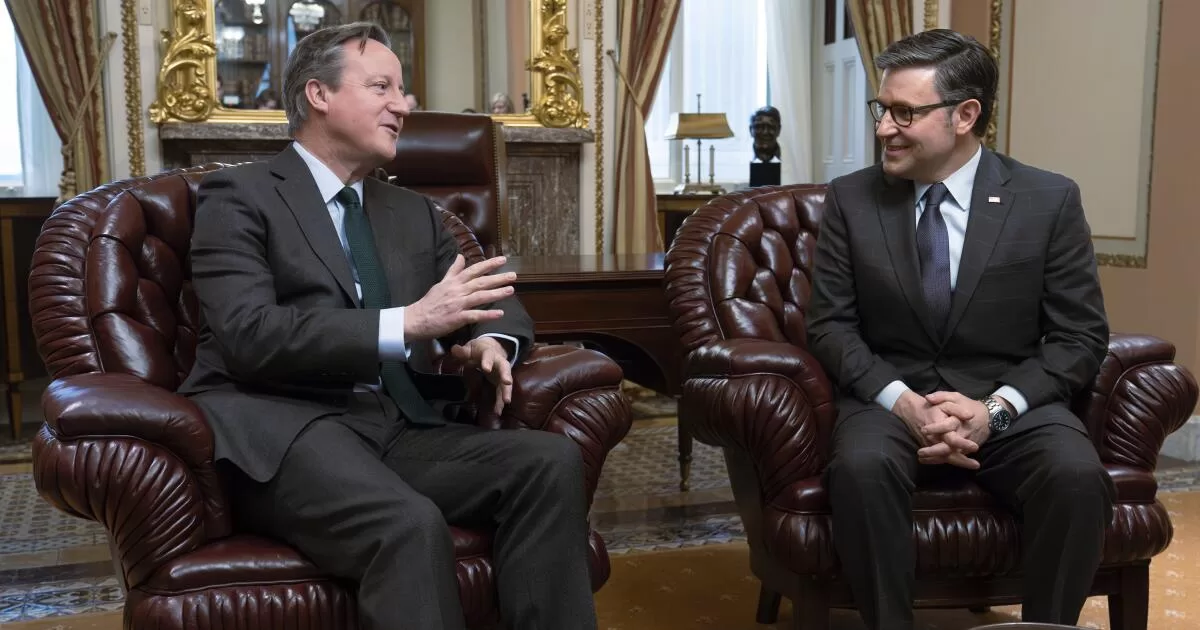Cameron says victory for Ukraine is “vital for American and European security,” but the former president and presumptive Republican candidate is a critic of continued U.S. support, and lawmakers aligned with him are holding up an aid package for Kyiv in Congress.
The U.K.’s Foreign Office confirmed the meeting, which was described as “productive” by the British side.
The U.K. government said it’s “standard practice” for government ministers to meet allied nations’ opposition leaders in election years.
Secretary of State Antony Blinken met in February with U.K. Labour Party leader Keir Starmer, who is the favorite to become prime minister in an election later this year. When Cameron was prime minister in 2012, he met the then-Republican presidential candidate Mitt Romney.
British officials did not say how the meeting went. Cameron and Trump have had several notable differences of opinion in the past. Cameron called Trump’s proposal during his first presidential campaign to ban Muslims from the U.S. “divisive, stupid and wrong.”
In a statement, Trump’s campaign said the meeting was held “to discuss several issues impacting both countries,” including upcoming elections in both Britain and the United States, the implications of Britain’s withdrawal from the European Union, the need for NATO allies to meet their commitments on defense spending and “ending the killing in Ukraine.”
The statement did not elaborate on those topics but added that Trump, Cameron and British ambassador to the U.S. Karen Pierce, had “also discussed their mutual admiration for the late Queen Elizabeth II.”
Cameron was British prime minister during the U.K.’s 2016 referendum on whether to leave the European Union — a move he opposed but that Trump enthusiastically supported. Cameron resigned after voters narrowly rejected his call to remain in the bloc.
Prime Minister Rishi Sunak unexpectedly brought Cameron back into government last year as Britain’s top diplomat.
In Washington, Cameron plans to urge U.S. lawmakers to approve a new aid package for Ukraine, warning Congress that it is putting the security of the West at risk by continuing to hold up the funding. He’s due to hold talks with lawmakers including Senate Republican leader Mitch McConnell (R-Ky.), and is hoping to meet House Speaker Mike Johnson (R-La.), whose role is key.
In a video posted last week on social network X, Cameron said: “Speaker Johnson can make it happen in Congress.”
A $60-billion package of military aid is bogged down in the House of Representatives as populist conservatives seek to block further funding for the two-year-old conflict and some mainstream Republicans demand concessions on border security before supporting the bill.
After Cameron urged U.S. lawmakers in February not to show “the weakness displayed against Hitler” in the 1930s, Trump ally Marjorie Taylor Greene said he should “worry about his own country.”
Ahead of his trip, Cameron said that “success for Ukraine and failure for [Russian President Vladimir] Putin are vital for American and European security.”
“This will show that borders matter, that aggression doesn’t pay and that countries like Ukraine are free to choose their own future,” he said. “The alternative would only encourage Putin in further attempts to re-draw European borders by force, and would be heard clearly in Beijing, Tehran and North Korea.”
Cameron is also due to discuss the Israel-Hamas war, including efforts to reach a “sustainable cease-fire” and get more aid into Gaza, in talks with officials including Blinken and National Security Adviser Jake Sullivan. The U.K. is sending a Royal Navy ship to the eastern Mediterranean to bolster efforts to open a maritime aid corridor between Cyprus and a temporary U.S.-built pier in Gaza.
Lee and Lawless write for the Associated Press. Lawless reported from London. Jill Colvin contributed from New York.
